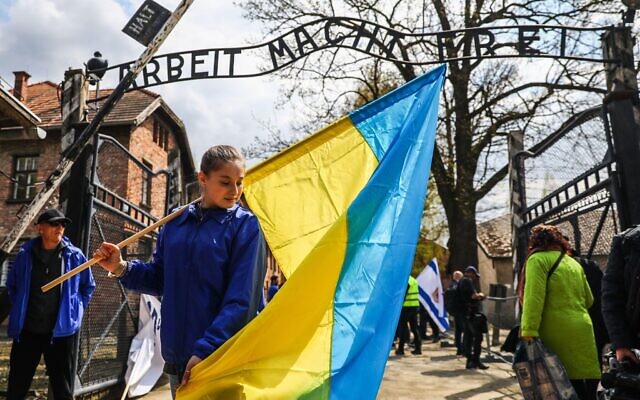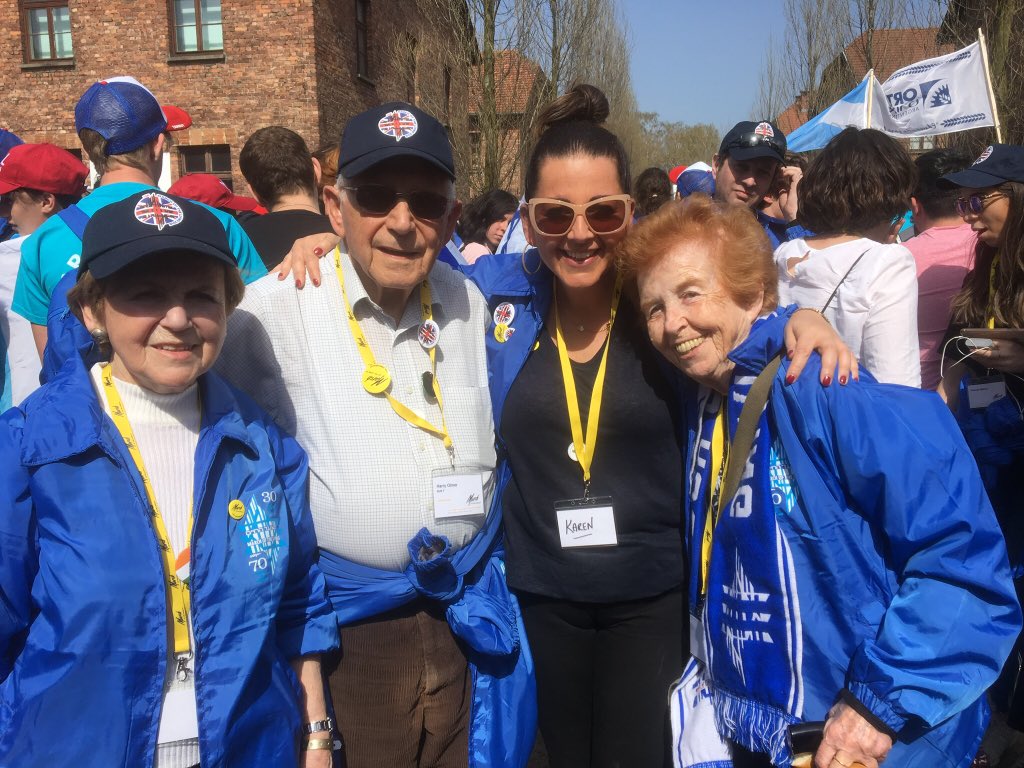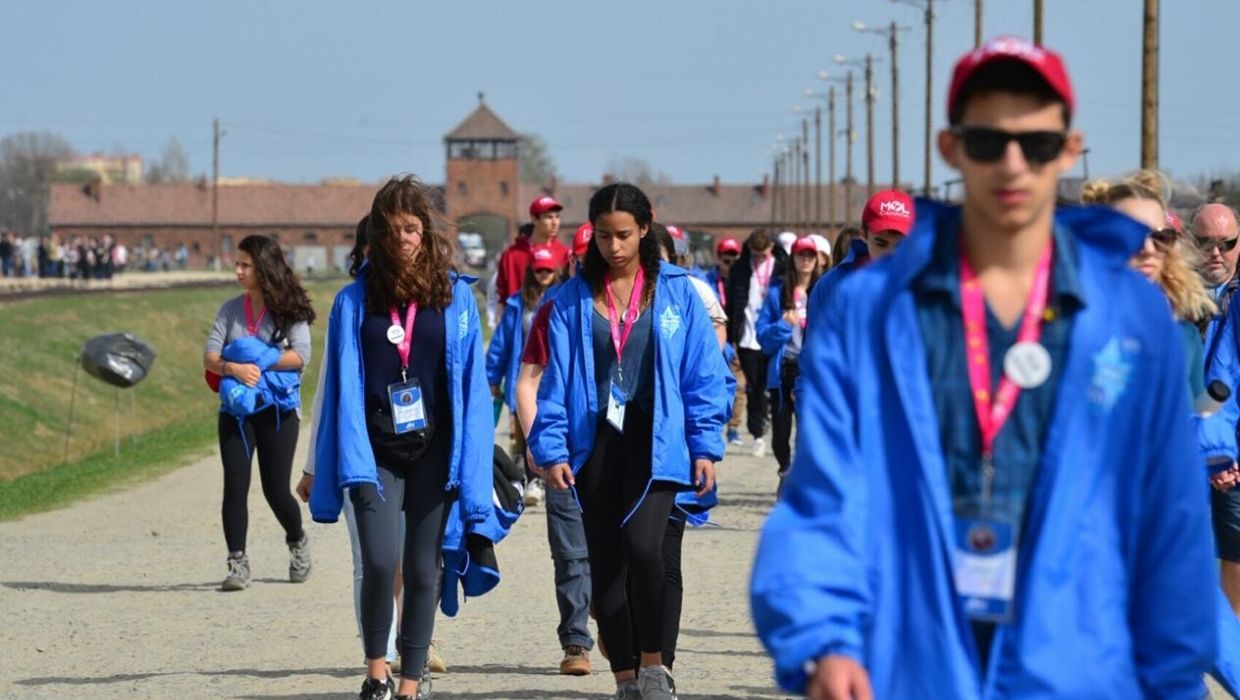‘There was smoke and a smell and I knew most of my friends were gone’
Jewish News joins survivor Arek Hersh at Auschwitz as he and a precious handful fellow survivors pass on the "torch of memory" during this week's March of the Living.

Every year on his birthday, Arek Hersh’s wife Jean tells him: ‘There you go Arek, that’s another year Hitler didn’t intend you to have.’
He is 93 now, has three daughters, seven grandchildren and two great grandchildren; several members of his family are with him as he returns to the place which still haunts his nightmare; Auschwitz.
Brandishing his still heavily tattooed number B7608 he says: ‘It is important people know about this.’
He is standing in a barrack at Auschwitz, part of a dwindling delegation of precious Holocaust survivors, here to ‘pass on the torch’ of memory for the March of the Living – an educational programme which starts with a deep dive into Jewish Polish history and the horror of the Holocaust – to a new generation.
Polish-born Arek went into his first concentration camp when he was just 11. He spent two years as a child slave at the Otoschno concentration camp – they took him as they couldn’t find his father. One of his jobs was cleaning the house of an SS officer. Another was collecting the dead body parts of men who had preferred to jump in front of a moving train in the camp than continue to live there. He grew up fast.
He was granted a brief reprieve when the camp was closed down when he was 13 and to his amazement, was taken home to joint his family in the Lodz ghetto. He didn’t dare tell the other women left in the ghetto that the sons and the husbands he had been there with were all dead. ‘I told them, ‘They’ve gone to another camp.’
His happiness at being reunited with his family lasted just two weeks when, along with his mother, sister, brother and cousins he was taken to the Polish Catholic Church in Sieradz. A chance encounter when he was searching for water saved him.
The Nazis had decided they needed a few more slave labourers back in the ghetto and chanced upon him as he was looking for a drink. As he was being driven off, his family was rounded up and taken to the Chelmno death camp where they all died as soon as they got there.
For the next two years he worked once again as a slave labourer in a textile mill while living in the ghetto orphanage. In 1944 the Nazis liquidated the ghetto and he was sent to the hell of Auschwitz.
He escaped death – just – once again by changing line at the selections when he realised Dr Mengele had put him in the line with the elderly, the youngest and the infirm. When there was a fuss in front of him – a woman would not let go of her baby – he moved line, pretended he was two years older – 16, not 14 – and had a skill as a lock maker. His previous camp experience had taught him well.

‘There was smoke and there was this smell and I knew within an hour of stepping from one line to another that most of the friends I had made in Lodz were gone,’ he recalls matter of factly. ‘They told me when I came into the barracks.’ Only a handful of the 185 children from the orphanage escaped the gas chamber.
He was there for eight months. As the Russians drew closer, he was sent on the death march to another concentration camp – Theresienstadt – followed by a month travelling in open-topped cattle wagons where he was so hungry, he started eating his leather shoes as the Nazis became ever more desperate to fulfil their dreams of total genocide. His resilience is genuinely astounding.
Only a handful of the 185 children from the orphanage escaped the gas chamber.
He was saved only when the Russians caught up with the Germans and peace was declared. Over the next few days, he saw his torturers rounded up and humiliated. Arek told one bunch of SS men that he only had to give a Russian soldier the word and they would be shot, ‘But we are not murderers like you.’
There is nothing more dramatic than hearing him describing what happened in a barracks at Auschwitz, at seeing his tattooed number as he recalls the hell of living there.
‘We would sleep six to a bed,’ he says, surveying the room. ‘There were no covers. We would sleep with what belongings we had on our heads.’ He points at the fireplace he is sitting in front of; ‘No one ever put the fire on, even when it was snowing outside.’
He recalls the meagre rations of soup: ‘There was a lot of hunger. Everyday people around me would die.’
His is a rare story of survival, as he stands in a former barrack on the grounds of the death camp which saw the murder of 1.1million Jews. For the march he is surrounded by hundreds and hundreds of young Jewish people from around the world all ready to take the baton of telling this story from him.
As the Holocaust survivors reach their mid-90s, they know they don’t have much longer to tell their stories which is why they are all here back in Poland while they still can.
‘It is important people remember,’ says Arek defiantly.

Thank you for helping to make Jewish News the leading source of news and opinion for the UK Jewish community. Today we're asking for your invaluable help to continue putting our community first in everything we do.
For as little as £5 a month you can help sustain the vital work we do in celebrating and standing up for Jewish life in Britain.
Jewish News holds our community together and keeps us connected. Like a synagogue, it’s where people turn to feel part of something bigger. It also proudly shows the rest of Britain the vibrancy and rich culture of modern Jewish life.
You can make a quick and easy one-off or monthly contribution of £5, £10, £20 or any other sum you’re comfortable with.
100% of your donation will help us continue celebrating our community, in all its dynamic diversity...
Engaging
Being a community platform means so much more than producing a newspaper and website. One of our proudest roles is media partnering with our invaluable charities to amplify the outstanding work they do to help us all.
Celebrating
There’s no shortage of oys in the world but Jewish News takes every opportunity to celebrate the joys too, through projects like Night of Heroes, 40 Under 40 and other compelling countdowns that make the community kvell with pride.
Pioneering
In the first collaboration between media outlets from different faiths, Jewish News worked with British Muslim TV and Church Times to produce a list of young activists leading the way on interfaith understanding.
Campaigning
Royal Mail issued a stamp honouring Holocaust hero Sir Nicholas Winton after a Jewish News campaign attracted more than 100,000 backers. Jewish Newsalso produces special editions of the paper highlighting pressing issues including mental health and Holocaust remembrance.
Easy access
In an age when news is readily accessible, Jewish News provides high-quality content free online and offline, removing any financial barriers to connecting people.
Voice of our community to wider society
The Jewish News team regularly appears on TV, radio and on the pages of the national press to comment on stories about the Jewish community. Easy access to the paper on the streets of London also means Jewish News provides an invaluable window into the community for the country at large.
We hope you agree all this is worth preserving.























